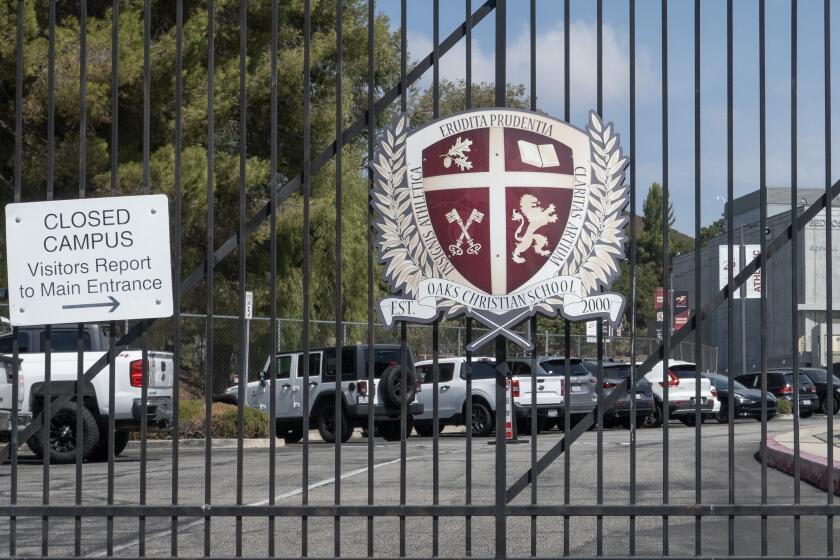Slow-Growth Group Accuses Developers of Buying Influence
A coalition of Southland slow-growth activists Thursday accused Orange County-based development firms of using campaign contributions to obtain pro-growth legislation in Sacramento.
The charges came as the activists, representing slow-growth organizations in five Southern California counties, held a news conference in Santa Ana to endorse Proposition 68, a campaign finance reform initiative on the June 7 statewide ballot. They displayed blue cardboard signs with handwritten lettering that proclaimed, “Limit Campaign Spending--Yes on 68.”
At the same time Thursday, 27 legislators announced their support for Proposition 68 at a news conference in Sacramento. None of the lawmakers is from Orange County.
Proposition 68 would limit campaign spending for state legislative races, restrict contributions from political action committees, corporations, organizations and individuals, and ban non-election year fund raising and transfers of campaign funds between candidates. The initiative would also provide limited public matching funds to qualifying candidates through a voluntary income tax checkoff.
At the news conference in Santa Ana, slow-growth coalition members said key lawmakers receive campaign contributions from developers and real estate brokers, and then author bills aimed at punishing cities and counties where slow-growth policies are winning public approval.
“If we follow the funds to Sacramento, it comes back in the form of ammunition against the citizens of Orange County,” said Tom Rogers, a San Juan Capistrano rancher and key proponent of Measure A, the Citizens’ Sensible Growth and Traffic Control Initiative on the countywide ballot.
Rogers said state Sen. William Campbell (R-Hacienda Heights) wrote 1986 legislation that authorized cities and counties to enter into pre-development agreements that give prior approval to projects still pending and insulates them from the effects of future changes in land-use policies, including slow-growth measures.
“I believe we’re the only state in the union that has pre-development agreements,” Rogers said.
He said the Irvine Co. and the William Lyon Co. are major beneficiaries of Campbell’s legislation. Campaign finance disclosure forms filed by Campbell show that Campbell still owes the Irvine Co. $50,000 and Lyon’s firm $10,000. The firms loaned Campbell the money for his unsuccessful 1986 campaign for state controller.
“In my 22 years of elective office, I have never had my integrity defamed in a more outrageous manner,” Campbell said Thursday. “At no time in my tenure as a state legislator has my legislative program ever been based on campaign funds I may have received. To accuse me of introducing legislation as a direct result of campaign contributions is to accuse me of breaking the law and my trust with the voters of my district. I am consulting with legal counsel to determine whether or not I should pursue a lawsuit against Mr. Rogers for his libelous remarks.”
Irvine Co. spokesman Larry Thomas called Rogers’ remarks “phony and gratuitous developer bashing, which we’ve come to expect from this crowd.”
“We support campaign reform and have made a contribution of $15,000 to an alternative measure sponsored by Assemblyman Ross Johnson (R-La Habra). The significant difference between the two is that the measure they (slow-growth activists) are supporting has an onerous provision for taxpayer financing of campaigns.”
Campbell “has never carried a developer agreement bill for us, and I have no reason to back away from our support for him,” Thomas added. “It is irresponsible to make a connection between the state controller campaign and a piece of legislation that he wasn’t even carrying for us.”
Linda Martin of San Diego, co-founder of the Southern California Coalition for Responsible Controlled Growth, said the group was formed after slow-growth activists from Orange, San Diego, Riverside, Los Angeles and San Bernardino counties discovered that they were fighting the same companies, and also the same bills in Sacramento.
Coalition members criticized a bill by Assemblyman Pete Chacon (D-San Diego) on Thursday that would require all slow-growth initiatives to be accompanied by an environmental impact statement, and a bill by state Sen. John Seymour (R-Anaheim) that would ban disbursement of state housing allocation funds to cities and counties that have adopted slow-growth measures or rent control.
Chacon’s bill died earlier this year, but Seymour’s bill has been approved in committee.
Coalition members said Seymour’s 1987 campaign finance disclosure forms showed that he had received $17,250 from the California Real Estate PAC, and $70,000 from “development interests” overall--during a non-election year.
Seymour was unavailable Thursday but previously has defended his bill as a fair response to jurisdictions that reduce the availability of low-to-moderate-priced housing by constraining supply.
Meanwhile, Irvine Mayor Larry Agran said during Thursday’s press conference that “we’re telling people that if you support growth-control measures at the local level, you need to get behind Proposition 68 as well.”
Fredric Woocher, spokesman for the Proposition 68 campaign committee known as Taxpayers to Limit Campaign Spending, said real estate and development interests had reported contributing at least $4.4 million to state legislative candidates during the past three years. About $1 million was contributed in 1987, a non-election year, 50% more than in 1985, the previous non-election year. He attributed the difference to efforts by developers to secure legislation that undercuts the slow-growth movement.
More to Read
Sign up for Essential California
The most important California stories and recommendations in your inbox every morning.
You may occasionally receive promotional content from the Los Angeles Times.










